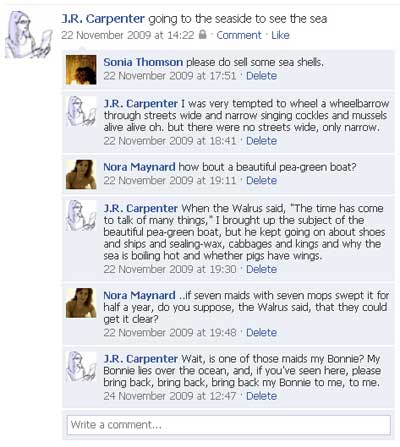I just added two new stories to in absentia, a site-specific web-based project about gentrification and its erasures in the Mile End neighbourhood of Montreal, an intimate and intensely personal investigation of a neighbourhood I lived and worked in for 17 years. in absentia was presented within Dare-Dare‘s Dis/location: projet d’articulation urbaine in 2008. Two weeks after the commencement of the project, Dare-Dare‘s mobile office was evicted from the parc sans nom, the Mile End vacant lot that had been its home for 2 years. A month after the completion of the project I was evicted from the Mile End apartment I lived in for 11 years, effectively forcing me out of the neighbourhood I lived in for 17 years and contributing to my decision to leave Montreal all together, after 19 years.
 Ironically, and somewhat painfully, dislocation from the locus of this work resulted in many opportunities to present the work around the world. The Mile End represented in in absentia has been exhibited, presented, performed and taught by myself and by others in Montreal, Toronto, Ottawa, Calgary, Banff, New York, Boston, Philadelphia, Providence, Finland, Sweden, Barcelona, Bristol, and other places I am unaware of. In each retelling of in absentia I am re-confronted with the questions that led me to creating the piece in the first place: What traces to people leave behind when they leave a place? What stories spring from absence?
Ironically, and somewhat painfully, dislocation from the locus of this work resulted in many opportunities to present the work around the world. The Mile End represented in in absentia has been exhibited, presented, performed and taught by myself and by others in Montreal, Toronto, Ottawa, Calgary, Banff, New York, Boston, Philadelphia, Providence, Finland, Sweden, Barcelona, Bristol, and other places I am unaware of. In each retelling of in absentia I am re-confronted with the questions that led me to creating the piece in the first place: What traces to people leave behind when they leave a place? What stories spring from absence?
Recently, I was invited to write about in absentia for Dislocation volet II de Dare-Dare, a publication celebrating projects supported by Dare-Dare during the two years they were located in Mile End. The publication project coordinator encouraged me to build on the stories in in absentia and/or write new ones. I other circumstance I would welcome the opportunity to creatively revisit a work in such a way. But in this case, I could not even begin to think about in absentia from the point of view of the person I was when I created the project. I am no longer that person. So much has changed.
The Dislocation volet II de Dare-Dare deadline is looming. I have been fretting. And then today, for whatever reason, two stories came to me – one, two, just like that. Like so many of the things I write, I had already written them, only I hadn’t noticed at the time. One comes from a series of facebook status updates I wrote whilst apartment hunting in Montreal last spring, phrased in the form of a game called: Which would you rather?
Let’s play where would you rather live: A) a god-forsaken place, or B) a dog-forsaken place? Trick question. I can live without god, not with out dog.
The full story can be read by clicking on the A Louer icon in the top left corner of the map on this page: http://luckysoap.com/inabsentia/alouer.html
The other comes from a blog post I wrote at the end of last year, reflecting on Reading Interrupted:
My suitcases and I spent the summer living out of other people’s bookshelves. It turns out that a friend close enough to put you up in a time of need tends to have a book collection close enough to your own to make you and your suitcases feel at home without a home.
The full story can be read by clicking on the books icon on the left side of the map on this page: http://luckysoap.com/inabsentia/perdu.html
I don’t know why the sudden arrival of these new stories from a place now past comes as a surprise to me. I have written of in absentia as a web “site” haunted by the stories of former residents of Mile End, a slightly fantastical world that is already lost but at the same time is still fully known by its inhabitants: a shared memory of the neighbourhood as it never really was but could have been. I am a former resident now, and these stories spring from that absence.


 Ironically, and somewhat painfully, dislocation from the locus of this work resulted in many opportunities to present the work around the world. The Mile End represented in
Ironically, and somewhat painfully, dislocation from the locus of this work resulted in many opportunities to present the work around the world. The Mile End represented in